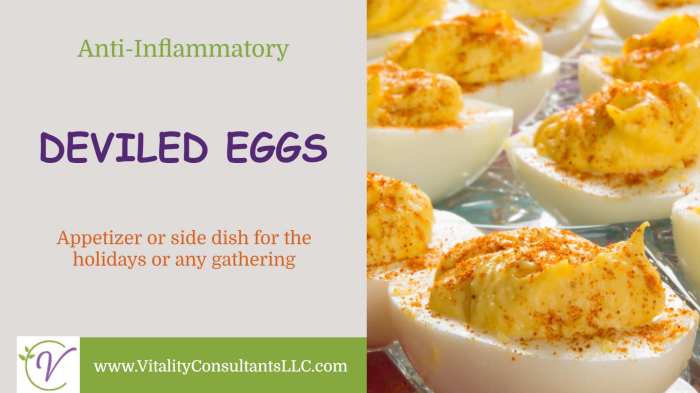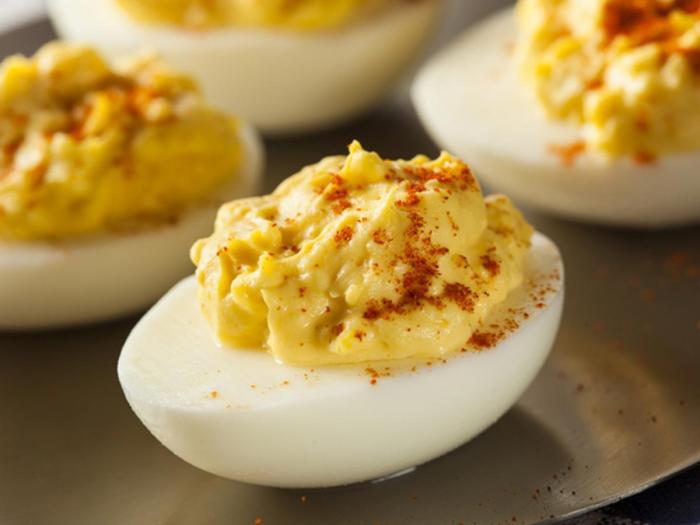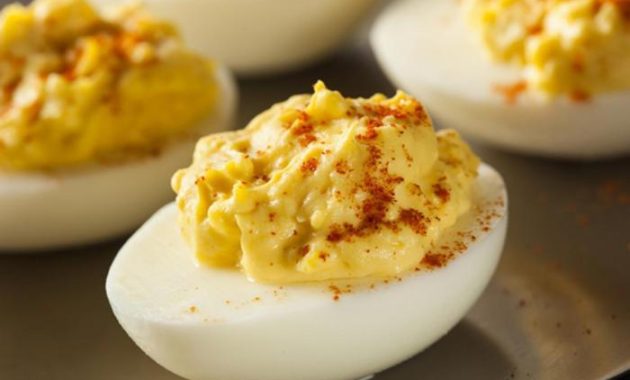Nutritional Composition of Deviled Eggs: Deviled Eggs Nutrition Facts
Deviled eggs nutrition facts – Yo, let’s break down the nutritional facts of deviled eggs. They’re a classic party snack, but what’sreally* in them? More than just creamy deliciousness, that’s for sure.
Macronutrient Breakdown of Deviled Eggs
Deviled eggs are a pretty good source of protein and fat, but not so much carbs. Here’s the lowdown on the macronutrient content per serving (approximately one-half of a large egg):
| Nutrient | Amount per Serving | % Daily Value | Notes |
|---|---|---|---|
| Protein | 3-4 grams | 6-8% | Provides essential amino acids. |
| Fat | 5-7 grams | 8-11% | Mostly unsaturated fat from the yolk, some saturated fat. |
| Carbohydrates | 1-2 grams | <1% | Primarily from added mayonnaise and seasonings. |
Micronutrient Content of Deviled Eggs
Beyond the big three (protein, fat, carbs), deviled eggs pack some serious micronutrients. These are vital for various bodily functions, so it’s cool to know what’s up.
Deviled eggs are a decent source of several vitamins and minerals. Here’s what you’ll find in a serving:
- Vitamin A: Supports vision and immune function.
- Vitamin D: Crucial for bone health and immune system regulation.
- Vitamin E: A powerful antioxidant protecting cells from damage.
- Vitamin K: Important for blood clotting and bone health.
- B Vitamins (Riboflavin, B12, etc.): Essential for energy production and nerve function.
- Choline: Important for brain health and liver function.
- Selenium: An antioxidant that supports thyroid function.
- Iron: Essential for oxygen transport in the blood.
- Potassium: Helps regulate blood pressure and fluid balance.
Cholesterol Content of Deviled Eggs
Okay, so here’s the deal with cholesterol. One deviled egg contains a significant amount, around 185-200mg. That’s a pretty big chunk of the recommended daily intake. While dietary cholesterol’s impact on blood cholesterol is less clear-cut than previously thought, it’s still a factor to consider, especially if you’re watching your cholesterol levels. Moderation is key, fam.
Deviled Egg Variations and Nutritional Impact

Yo, let’s get real about deviled eggs. They’re a classic party snack, but the nutritional value can totally swing depending on what you throw in. We’re breaking down how different ingredients and mayo types change the game.
Think of it like this: deviled eggs are a blank canvas. The base recipe is pretty straightforward, but the additions and substitutions are where the nutritional story gets interesting. We’ll explore how different mayonnaises and extra ingredients impact the calorie count, fat content, and overall nutritional profile.
Mayonnaise Type and Nutritional Profile Comparison
The mayo is the MVP here. Different types drastically alter the fat and calorie content. Check out this breakdown:
| Mayonnaise Type | Fat Content (approx. per tbsp) | Calorie Count (approx. per tbsp) | Impact on Overall Nutrition |
|---|---|---|---|
| Full-Fat Mayonnaise | ~11g | ~100 | Higher in fat and calories, richer flavor. |
| Light Mayonnaise | ~5g | ~50 | Lower in fat and calories, slightly less rich flavor. |
| Avocado Mayonnaise | ~12g (variable depending on recipe) | ~110 (variable depending on recipe) | Higher in healthy fats (monounsaturated), creamy texture, may add more calories. |
Impact of Added Ingredients
Adding stuff to your deviled eggs is where you can really customize the flavor
-and* the nutrition. Here’s the lowdown on some popular additions:
- Bacon Bits: Adds fat and sodium, significantly increasing calorie count. Think of it as a flavor bomb, but a salty, fatty one.
- Different Spices (Paprika, Cayenne, etc.): Generally minimal impact on calories and fat, but spices can add flavor and potential health benefits (antioxidants in paprika, for example).
- Hot Sauce: Minimal impact on calories and fat, but adds a kick and potential health benefits depending on the ingredients (some hot sauces contain vitamins and antioxidants).
- Chopped Veggies (Celery, Chives): Adds fiber and vitamins with minimal impact on calories and fat. A great way to boost the nutritional profile.
Healthier Deviled Egg Recipe, Deviled eggs nutrition facts
Here’s a recipe that dials down the fat and cholesterol without sacrificing that delicious deviled egg goodness:
Ingredients:
- 6 large eggs
- 2 tablespoons light mayonnaise
- 1 tablespoon plain Greek yogurt (adds protein and creaminess)
- 1 teaspoon Dijon mustard
- 1/4 teaspoon paprika
- Salt and pepper to taste
- Chopped chives for garnish (optional)
Instructions: Hard-boil eggs, cool, peel, and halve. Remove yolks and mash with mayonnaise, yogurt, mustard, paprika, salt, and pepper. Fill egg whites with yolk mixture and garnish with chives.
| Nutrient | Original Deviled Egg (full-fat mayo) | Healthier Deviled Egg (light mayo & Greek yogurt) |
|---|---|---|
| Calories (per egg) | ~75-85 | ~60-70 |
| Fat (per egg) | ~6g | ~3-4g |
| Cholesterol (per egg) | ~185mg | ~185mg (similar, due to egg yolks) |
| Protein (per egg) | ~6g | ~7g (slightly higher due to yogurt) |
These are approximate values and will vary depending on specific ingredients and portion sizes.
Deviled Eggs in a Balanced Diet
Yo, so deviled eggs are, like, totally tasty, but fitting them into a healthy diet needs a little strategy. It’s all about balance, portion control, and knowing what’s up with their nutritional profile. Think of it as leveling up your meal game, not derailing it.Deviled eggs contribute to your daily nutrient intake in several ways. They pack protein from the eggs, which is key for building and repairing tissues.
Understanding deviled eggs nutrition facts requires considering their relatively high cholesterol content from the yolks. However, a comparison with other processed snacks reveals interesting contrasts; for instance, examining the nutritional profile of klondike no sugar added nutrition facts highlights the significantly higher fat and sugar content in that dessert. Ultimately, the nutritional value of deviled eggs depends on portion size and overall dietary context.
They also offer choline, important for brain health, and some vitamins and minerals, depending on what you add to your deviled egg mix. However, they’re also relatively high in fat and cholesterol, so moderation is the name of the game. Don’t go overboard, and you’re golden.
Deviled Egg Incorporation Guidelines
Incorporating deviled eggs into a healthy eating plan involves smart choices regarding portion sizes and how often you eat them. Think of them as a delicious, occasional treat rather than a daily staple. A good rule of thumb is to limit yourself to one or two deviled eggs per serving, maybe twice a week max. This helps you enjoy the flavor without overdoing it on the fat and cholesterol.
Remember, balance is key.
Sample Meal Plan with Deviled Eggs
Let’s break down how deviled eggs fit into a sample meal plan, showing their nutritional impact. We’ll use some realistic serving sizes and approximate nutritional values. Keep in mind that these values can vary based on ingredients and preparation methods.
| Meal | Food Item | Serving Size | Nutritional Contribution (Approximate) |
|---|---|---|---|
| Breakfast | Oatmeal with berries | 1 cup | High in fiber, complex carbohydrates, and antioxidants. |
| Lunch | Salad with grilled chicken | 4 oz chicken, large salad | Lean protein, vitamins, and minerals from vegetables. |
| Snack | Deviled Eggs | 2 eggs | Protein, choline, some vitamins and minerals, moderate fat and cholesterol. |
| Dinner | Baked Salmon with roasted vegetables | 4 oz salmon, 1 cup vegetables | Omega-3 fatty acids, protein, vitamins, and minerals. |
Potential Health Concerns and Considerations

Yo, deviled eggs are totally tasty, but like, every food has a flip side, right? Let’s break down some potential health concerns you should be aware of before you gobble up a whole plate. We’re talking allergies, food poisoning, and what to watch out for if you’ve got specific dietary needs.Deviled eggs, while delicious, aren’t without their potential pitfalls.
Understanding these potential issues and taking preventative measures can help ensure you enjoy this classic appetizer safely and responsibly.
Allergens in Deviled Eggs
Deviled eggs contain a few common allergens, mainly eggs themselves (duh!), and any additional ingredients you might add. People with egg allergies should obviously steer clear. If you’re using mayonnaise, be mindful that it often contains soy or other potential allergens. Likewise, if you add mustard, relish, or other seasonings, check the labels carefully to ensure they’re safe for anyone with allergies in your crew.
Always read ingredient lists to avoid any unexpected reactions. For individuals with severe allergies, even trace amounts can be a problem, so be extra cautious when preparing deviled eggs for a group.
Foodborne Illness Risks and Prevention
Okay, so this is serious. Deviled eggs are a prime breeding ground for bacteria, especially
Salmonella*, because they contain both eggs and mayonnaise – a creamy, delicious paradise for nasty germs. Improper handling and storage can lead to a serious case of food poisoning. Here’s the lowdown on keeping things safe
- Use fresh, high-quality eggs: Cracked or damaged eggs are a big no-no.
- Cook eggs thoroughly: Make sure the yolks are firm and not runny. Undercooked eggs are a major risk factor.
- Refrigerate promptly: Deviled eggs should be chilled immediately after preparation and kept at 40°F (4°C) or below. Don’t let them hang out at room temperature for more than two hours.
- Practice good hygiene: Wash your hands thoroughly before and after handling eggs and other ingredients.
- Use clean utensils and surfaces: Avoid cross-contamination by using separate cutting boards and utensils for raw and cooked foods.
- Don’t let them sit out too long: Leftovers should be discarded after 24 hours. Seriously, don’t risk it.
Dietary Considerations for Specific Health Conditions
Deviled eggs aren’t exactly a health food superstar. They’re relatively high in cholesterol and saturated fat, which can be a concern for people with high cholesterol or heart disease. The cholesterol content in one deviled egg can be significant. For those watching their cholesterol, limiting portion sizes is key. Folks with heart disease might need to discuss deviled egg consumption with their doctor or a registered dietitian to determine if it fits into their overall dietary plan.
Also, remember that the addition of bacon or other high-fat ingredients can further increase the saturated fat and cholesterol content.
Query Resolution
Are deviled eggs suitable for a low-fat diet?
No, deviled eggs are inherently high in fat, primarily due to the mayonnaise. While healthier alternatives exist, they still contain significant fat content. Portion control is crucial for those on low-fat diets.
Can I make deviled eggs without mayonnaise?
Yes, you can use alternatives like plain Greek yogurt or avocado to create a lower-fat version. However, the texture and flavor will differ significantly.
How long can deviled eggs be safely stored?
Deviled eggs should be refrigerated and consumed within 24-48 hours to minimize the risk of foodborne illness.
What are the best ways to reduce the cholesterol in deviled eggs?
Using a lower-fat mayonnaise and reducing the egg yolk content can help lower the cholesterol. However, deviled eggs will still contribute significantly to daily cholesterol intake.

